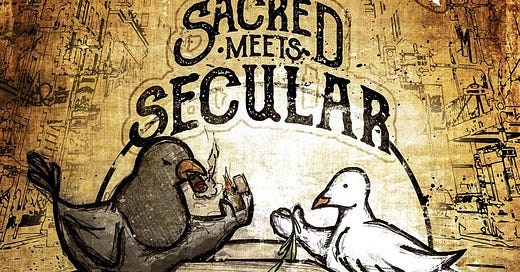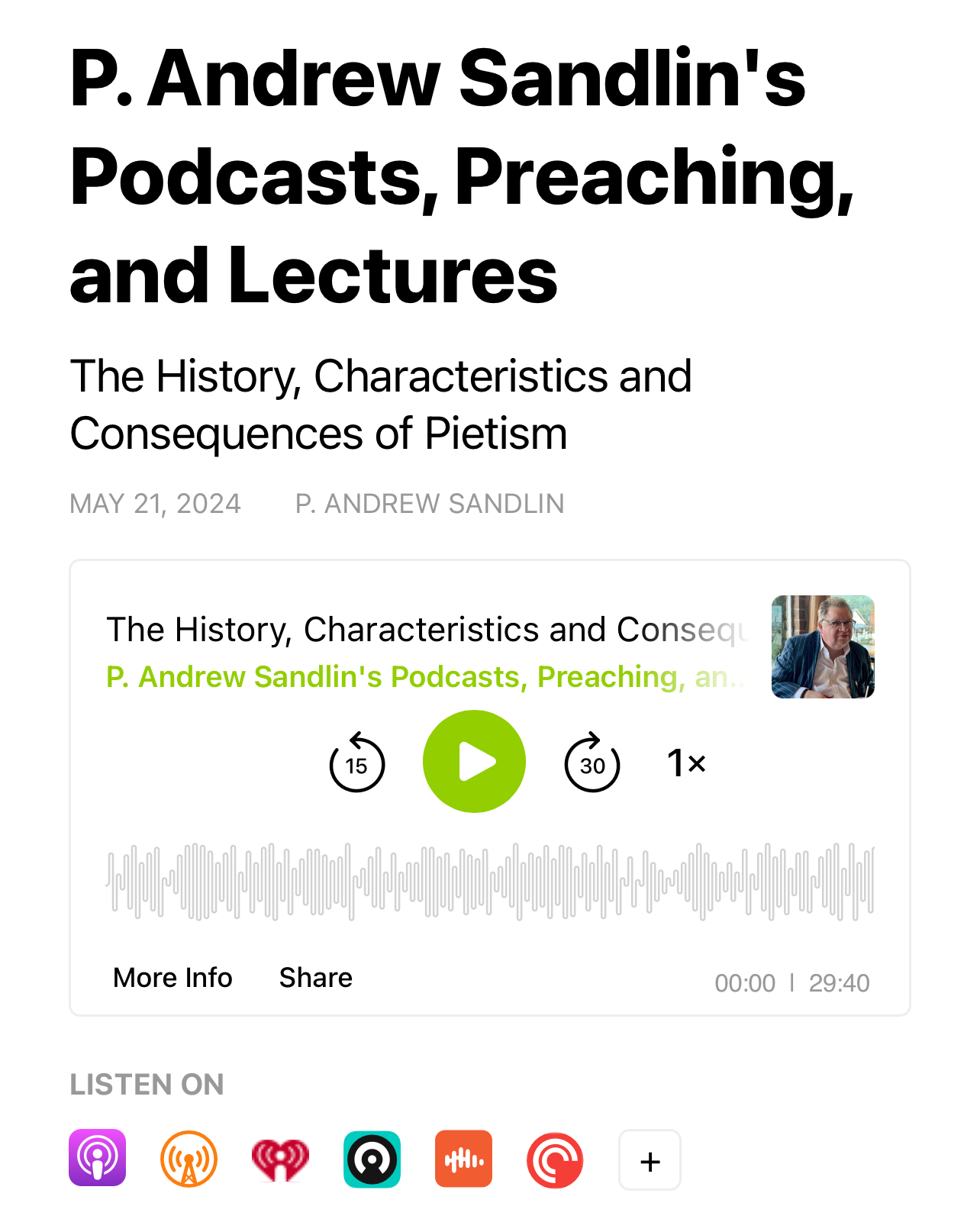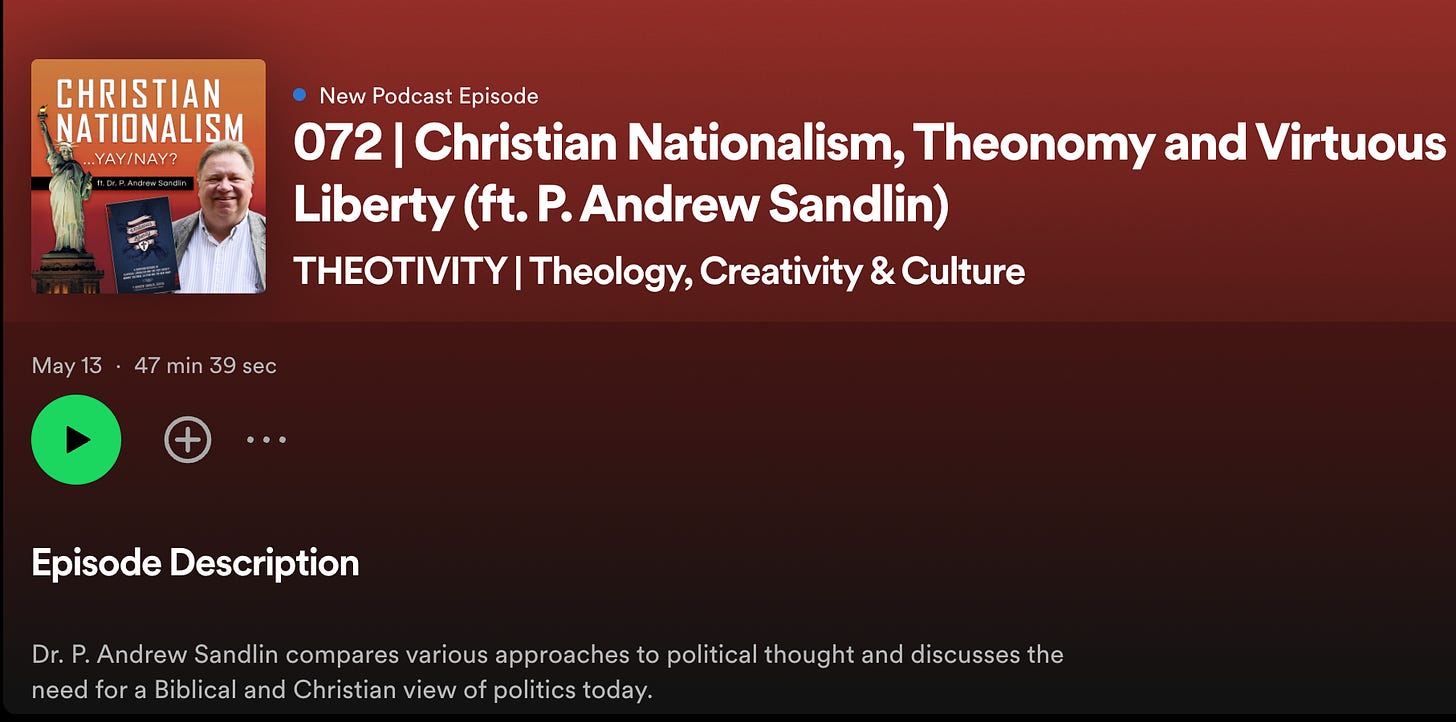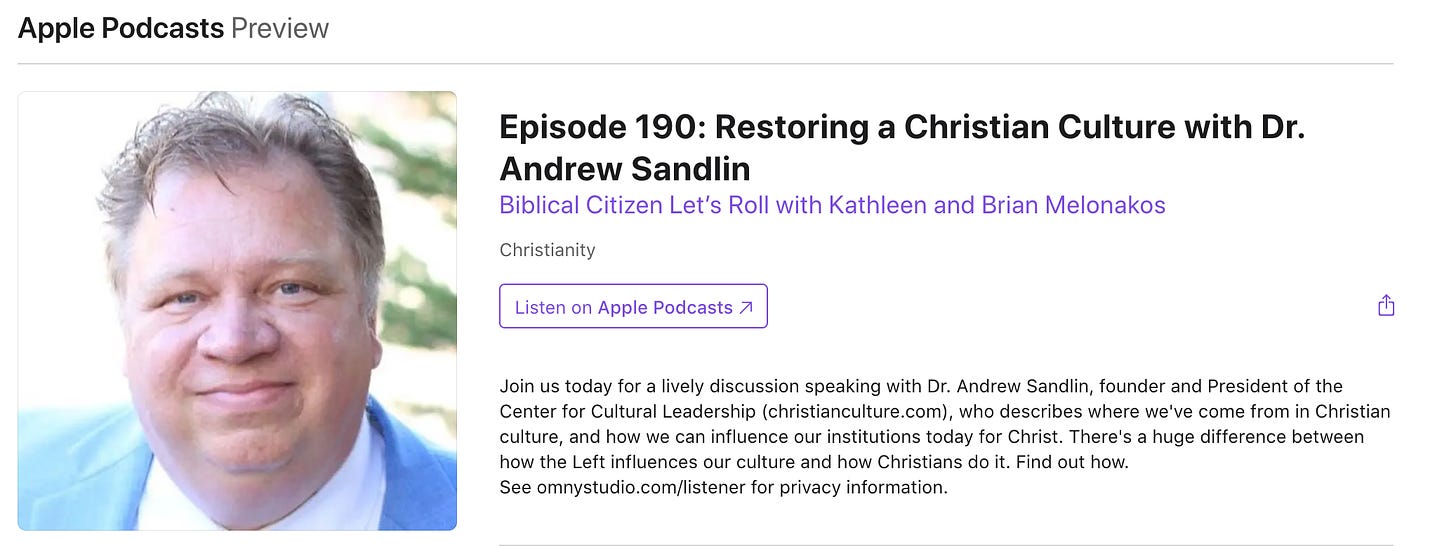There Is No Sacred-Secular Distinction
The goal of modern secularism is to get the church out of every aspect of society except its own sanctuary. Many Christians agree.
Dear friends and supporters:
A couple of centuries ago and before, when you saw the word secular, you knew it meant the social order outside the church. The sacred is everything inside the four walls of the church, and the secular everything outside. But “secular” didn’t mean anti-Christian.
If you read “secular” today in older writings, you might get the impression that there was a sharp distinction between a truly Christian church and a radically secular order outside the church, where “secular” meant anti-Christianity. This is far from the truth. Until about the 19th century in Europe and the 20th in the U. S., almost everybody expected that society would be “leavened” by the church, even though society was deemed “secular” = non-churchly.
This is not the meaning of “secular” today.
The Sacred-Secular Distinction
Secularism in our era is both an ideology and a worldview allegedly purged of any religion. I say allegedly, because due to the fact that religion is the very heart of man and reality, all of life is religious. The only question is: Which religion?
The religion of modern secularism is profoundly anti-Christian and naturalistic (meaning: there is nothing beyond what our senses can detect). The statement does need some qualification, since secular can (and usually does) also refer to a particular vision of the social order outside the church, with little concern for the church itself. That is, one can be a secularist and still remain untroubled at devout Christianity within the church. The only essential secular realm is the “public” realm.
This is not a recent idea. Owen Chadwick quotes the late 19th century Marxists as hammering out in their creed that “religion is a man’s private concern … religion should be eradicated not only from public life but from public influence [emphasis original].”
Meaning all religion except theirs, of course.
Devout Christianity in the privacy of your own home or between your two ears is just fine — since it’s irrelevant to the important spheres of life.
So secularism as a worldview doesn’t demand the relentless secularization of all of life, though many secularists wouldn’t mind this development. Rather, it means secularization of all areas of the culture outside those traditionally understood as sacred, in other words, the church.
The Nature-Grace Distinction
In fact, this older, traditional sacred-secular distinction, which emerged in the medieval world,1 laid the groundwork for the modern secular worldview. How? By arguing there were permissively non-Christian areas of life, the medieval church drilled numerous holes in the cultural dike that led in time to the dike-bursting assumption that non-Christian areas of life weren’t only permissible, but essential.
This is called the nature-grace distinction. Grace is the realm of the church and its sacramental system. This is the “higher,” “spiritual” realm. Nature is all that is outside the church and is governed not by Christ and the Bible but by philosophy and natural theology and natural law that all reasonable people, Christian or not, can agree on. This is the “lower,” “non-spiritual” realm. It’s necessary for this realm of “nature” to be non-Christian, since we can’t expect unbelievers to accept the truths of Christianity, though the church (the sacred) should still try to influence it.
The goal was no longer to get everything outside the church into contact with the church. It was rather to get the church out of every aspect of society except its own sanctuary.
The goal, in fact, was to get these areas outside the church into contact with the church’s elaborate sacramental system by which they could be ecclesiasticized. This meant they could be “baptized” by Christianity (“grace”) without actually having to be biblical. The church covered all “natural” sins. You could go on your merry, non–biblical way, as long as you partook of the sacraments and stayed in the church’s good graces. For example, civil rulers need not govern by or be governed by biblical law as long they submit to hierarchical sacramentarianism.
The Enlightenment set in motion a transition from this medieval paradigm to the modern social order, which demands strict limits on the places Christianity is permitted to go. The goal was no longer to get everything outside the church into contact with the church. It was rather to get the church out of every aspect of society except its own sanctuary. The list of acceptably Christian-influenced places grew exceedingly small. Public education and science and entertainment and politics were not on that list.
This is modern secularism.
The Christian-Secularist Indistinction
Now a fascinating fact is how many devout Christians agree with this arrangement, though they arrive from a different direction than secularists do. For these devout but misguided Christians, the problem isn’t so much that the public order must be kept safe from Christianity, but that the sacred order of family and church must be kept safe from the public order. They don’t mean just the sinful order (which we all should believe), but rather from the public order itself. In other words, Christianity shouldn’t concern itself with matters like education and entertainment and music and technology and politics in the wider culture, because that interest itself will compromise the sacred, churchly order. So Christian and secularist don’t hold distinct views on the modern sacred-secular distinction, though their reasons for the indistinction are different.
The Sacred-Profane Distinction
The Bible knows nothing of a sacred-secular distinction, only of a sacred-profane distinction. This means all that is not dedicated to the Lord and subjugated to his authority is a profanation of his good creation and common grace and biblical will. This is a theoretical way of saying that everything should be God-honoring and Christian. And by everything, I mean everything: education, music, science, dance, politics, farming, architecture, engineering, technology, entertainment, sports — everything:
Let the heavens rejoice, let the earth be glad; let the sea resound, and all that is in it. Let the fields be jubilant, and everything in them; let all the trees of the forest sing for joy. (Ps. 96:11-12)
[W]hether you eat or drink, or whatever you do, do all things for the glory of God. (1 Cor. 10:31)
The rabid secularism of our time, as well as the revived ancient paganism, and Leftist neopaganism that have arrived in its wake, is a direct consequence of the church’s insistence on the sacred-secular distinction. Name the great social depravities of our time – abortion on demand, gay “marriage,” “gender affirmation surgery,” no-fault divorce, pornography, Darwinism, racism (Left and Right), materialism (both theoretical and practical), statism — in the Western world. All of these evils are unthinkable apart from the sacred-secular distinction of the medieval world that gave way after Enlightenment to the gradual secularization of all life outside the church.
This verifies the classic aphorism: If Jesus is not Lord of all, he’ll eventually not be Lord at all.
Conclusion
The obvious cure for this widespread social disease is the erasure of the line between sacred and secular and the creation of a line between sacred and profane. It should be understood by Christian and non-Christian alike that there are only two possibilities within reality: the sacred, under Christ’s authority, and the profane, rebellion against his authority; there is no third status.
Moreover, the church has no privileged “sacred” status — all of life should be sacred. The church is one vital sphere among several God-ordained institutions. To vest the church with an exclusively sacred status is eventually to abandon the world to secularism, paganism, and Satan.
The recognition and implementation of this sacred-profane biblical scheme is not accomplished by some massive revolutionary political takeover, but rather by the bold preaching of the gospel, by the peaceful capture of all spheres of life for Christian truth, and by the voluntary submission of cultures to our Lord and Savior Jesus Christ.
When the sacred is the rule, and the profane is the exception, the kingdom of God will come as far as it can to earth in a fallen, pre-consummate world. Only when we enter the consummate, eternal world will all that is profane be purged.
Yours for the King,
Founder & President, Center for Cultural Leadership
The History, Characteristics and Consequences of Pietism
Listen here.
Worldview Youth Academy in Tennessee
Friends, I hope you’ll join me this summer in Tennessee for this worldview event. Also, please consider sponsoring high school students for this transformational time.
Explore here.
Christian Nationalism Versus Virtuous Liberty
Listen here.
How the Tide Turned Against Christian Culture
Interview on the problem of statism, the loss of the Protestant work ethic and therefore wealth, the cultural cost of losing the idea of sin, the flight to the interior, how Christian culture started in the West, and how Immanuel Kant turned the tide against Christian culture.
Listen here.
More great stuff
The Center for Cultural Leadership site is here.
My Amazon author page (print and digital) is here.
My I-Tunes sermons, lectures and podcasts are here.
You can find my sermons and lectures at my YouTube channel.
Sign up to get my blog updates here.
Here’s my Twitter feed.
If you want to get the free exclusive hard copy publication Christian Culture, please send me a Facebook private message.
The CCL phone number is 831-420-7230.
The mailing address is:
Center for Cultural Leadership
P. O. Box 100
Coulterville, CA 95311
Some historians of ideas believe secularism began with the Renaissance idea that man must turn from obsession with otherworldly concerns to concentration on thisworldly concerns. But, properly understood, this is a biblical idea — the Bible is much more concerned with man’s calling in God’s created world than in planning an escape route to heaven. This “secularism” is far different from both the secularism of the Middle Ages and the secularism of the modern world.










There are no vacuums when it comes to legislated morality or what's, more often than not, immorality. Consequently, a nation's foundational ethical standard determines its God.
Thus, there is likewise no vacuums when it comes to religious-influenced governments, be it even Secular Humanism in its multifaceted forms, and it usually is.
When one understands that idolatry is not so much about statues as it is statutes, it becomes clear that all governments are theocratic (god ruled), serving either the true God or some false god, demonstrated by what laws they keep and consider the supreme law of the land.
Question: Were the governments in the Old Testament under the god Baal (or any other false god named in the Old Testament) theocracies?
Answer: Of course, they were.
Question: Was Baal (or any other god named in the Bible) real or were they merely ancient forms of We the People?
Answer: Merely ancient forms of We the People. See 1 Corinthians 8:4-6.
Consequently: "...There is no escaping theocracy [or theonomy]. A government’s laws reflect its morality, and the source of that morality (or, more often than not, immorality) is its god. It is never a question of theocracy or no theocracy, but whose theocracy. The American people, by way of their elected officials, are the source of the Constitutional Republic’s laws. Therefore, the Constitutional Republic’s god is WE THE PEOPLE.
"People recoil at the idea of a theocracy’s morality being forced upon them, but because all governments are theocracies, someone’s morality is always being enforced. This is an inevitability of government. The question is which god, theocracy, laws, and morality will we choose to live under?..."
For more, see online Chapter 3 "The Preamble: WE THE PEOPLE vs. YAHWEH" of "Bible Law vs. the United States Constitution: The Christian Perspective" at bibleversusconstitution.org/BlvcOnline/biblelaw-constitutionalism-pt3.html
How would the scared-profane distinction apply to music made by non-Christians? Would it all be considered profane? Or would that only be the case if it is deliberately opposed to God and his law in some way?